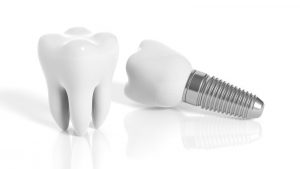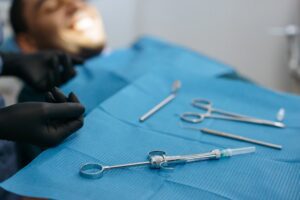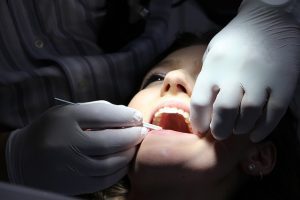Your orthodontist specializes in treating crooked and misaligned teeth, with interventions that move your teeth and even the position of your jaw. However, orthodontic issues are often symptoms of structural and/or developmental abnormalities. These require an oral surgeon that specializes in complicated orthodontia cases, especially in cases of pediatric orthodontic surgery.
Granted, just the term “surgery” can be a little intimidating. But there are many forms of oral surgery, each addressing a specific need, whether cosmetic or functional. Because of recent technological developments, our practice can perform previously invasive and painful oral surgeries like wisdom tooth extractions with alternative techniques that are much gentler on our patients but achieve the same results or better.
A Patient-Centered Approach to Orofacial Surgeries
The important thing to remember is you are in good hands; our oral surgeon and staff are committed to serving our patients with the utmost care and highest level of surgical skill. Dr. Puckett is a trained and licensed oral and maxillofacial surgeon who prioritizes the comfort and safety of our patients. He is certified to provide all forms of anesthesia and sedation for oral surgeries.
We can help ensure your visit for oral surgery is relaxed and as pain-free as possible. Our practice is known for our comfortable and gentle approach, and Dr. Puckett is experienced in the specifics of neonatal and pediatric oral and maxillofacial surgery.
Types of Oral Surgeries for Orthodontic Pathologies
The most common oral surgery procedures to correct orthodontic concerns, including jaw misalignment and skeletal discrepancies include:
- Exposure of impacted teeth, most commonly canines
- Removal of erupted and impacted permanent teeth
- Removal of retained or ankylosed primary teeth
- Removal of extra, or supernumerary, teeth
- Early removal of wisdom teeth interfering with proper eruption of second molar teeth
- Surgical repositioning of improperly positioned teeth
- Temporary anchorage device (TAD) placement
- Routine wisdom teeth extractions
More complicated orofacial procedures for severe skeletal issues include:
Distraction Osteogenesis
For severe jaw discrepancies, this technique gradually lengthens the jawbone by inserting a distraction device and slowly expanding it over time.
Bone Grafting
In cases of jawbone deficiency, dental bone grafts harvested from other areas of the jaw or donor sources are used to build up volume, creating a stable foundation for implant placement or tooth movement.
Orthognathic Surgery
This type of oral surgery reshapes the jawbones to correct misalignment, improving bite function and facial aesthetics. Procedures like upper jaw advancement and lower jaw setback address overbites, underbites and open bites.
Benefits of Surgical Interventions for Orthodontic Issues
There are some things braces can’t fix, and some maxillofacial conditions that require surgery to truly solve the problem. The benefits to the patient cannot be understated:
- Faster and More Predictable Results: Surgery can achieve significant jaw repositioning and tooth movement in a shorter timeframe compared to traditional orthodontics alone.
- Improved Bite Function: Correcting severe jaw misalignment leads to a more stable and functional bite, reducing chewing difficulties and joint pain.
- Enhanced Facial Aesthetics: Addressing significant jaw discrepancies and tooth impaction can dramatically improve facial balance and self-confidence.
- Long-Term Stability: Surgical correction often provides more stable and permanent results compared to orthodontics alone, especially for complex cases.
What Affects a Surgeon’s Approach to Orthodontic Surgery?
Oral surgery isn’t a cheat code for traditional orthodontia, but an alternate intervention that can speed and optimize treatment in complex cases that require a more intensive approach. Factors that will affect whether your oral surgeon recommends orthodontic surgery as well as what that surgery might entail include:
Severity of Malocclusion
Severe jaw misalignment that impacts tooth function and facial aesthetics, often necessitates maxillofacial surgery to move everything to its correct position at once. This is much simpler and more time-effective than trying to install several orthodontic devices at once and adjusting them sequentially over the course of months or years.
Facial Harmony
When facial asymmetry or disproportionate jaw profiles are present, oral and orofacial surgery can improve facial balance and aesthetics. Both of these factors are integral to quality of life, especially in cases of severe jaw misalignment, which can affect not only appearance, but chewing, speaking and breathing.
Skeletal Maturity
Orthodontics are best done while the patient is still growing, so that by the time the bones mature and settle, they’ve been put in their correct place. This means that for older patients whose bones are mature, an oral surgery may be appropriate more often than it is with pediatric dentistry.
Medical Conditions
Certain medical conditions may require additional precautions or contraindicate specific surgical approaches. For instance, if a patient cannot undergo general anesthesia, dental implant placement may not be an option after a corrective tooth extraction.
Patient Preferences
Understanding individual needs and concerns plays a crucial role in tailoring the treatment plan. This affects your surgeon’s approach to treatment, anesthesia and sedation for the oral surgery, and the extent that surgery is used in tandem with or as an alternative to traditional orthodontic techniques.
Who Needs Oral Surgery for Orthodontic Concerns?
In most cases, these procedures are done for patients under the age of 18. This is ideal, as the formations of the jaw are not yet set and are more malleable for treatment. Another advantage of oral surgical intervention earlier in life is that young people’s bodies are more effective at healing than those of adults.
However, we treat adults with orthodontia issues as well, including patients well into their fourth or fifth decades. You may benefit from orthodontic surgery at any age. Treatment tends to be more complicated the older you are, but our gentle approach to care and our state-of-the-art techniques for oral surgeries optimize the experience of our older patients.
An Oral Surgeon with a Compassionate, Collaborate Approach to Orthodontia
The key to successfully manipulating complex issues of the mouth and jaw is teamwork on the part of your oral surgeon, orthodontist, and any other necessary specialists like ENTs, plastic and maxillofacial surgeons. And another crucial piece of the puzzle: the patient! Open and thorough communication makes the whole process cleaner and calmer. And both of these factors are of the utmost importance at our Wilmington oral surgery practice.
If you have a problem with your bite, visit our office for a consultation with Dr. Puckett, who will examine you and likely take a dental x-ray before discussing your diagnosis and treatment options.









